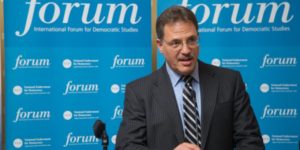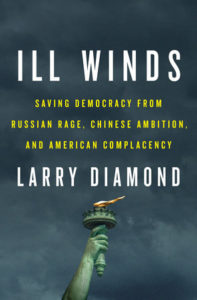 Without the support of the U.S. government, pro-democracy forces around the world will wither as authoritarianism gains ground, argues Larry Diamond, a senior fellow at Stanford University’s Hoover Institution and Freeman Spogli Institute for International Studies. The cultural relativist critique that Americans and Europeans should not push so-called Western values on non-Western societies is a form of arrogance, on three levels, he writes for Foreign Policy:
Without the support of the U.S. government, pro-democracy forces around the world will wither as authoritarianism gains ground, argues Larry Diamond, a senior fellow at Stanford University’s Hoover Institution and Freeman Spogli Institute for International Studies. The cultural relativist critique that Americans and Europeans should not push so-called Western values on non-Western societies is a form of arrogance, on three levels, he writes for Foreign Policy:
- First, it suggests that freedom, while precious to people in the West, isn’t important to or needed by people elsewhere; it implicitly argues that people elsewhere don’t have the same innate rights as human beings. But since the end of World War II, numerous international treaties and declarations have codified civil and political rights as universal human rights.
- Second, this brand of cultural relativism falsely suggests that liberal democratic values of individual rights, political accountability, and limited government only have their roots in the Western enlightenment, when in fact one can point to relevant traditions in many other cultures, from Confucian norms mandating good governance and justifying the people’s right to rebel against despotism to India’s vaunted traditions of pluralism, tolerance, and deliberation.
- And, finally, it just doesn’t reflect the evidence from public opinion surveys, which shows that the desire for democratic, accountable government—rooted in the rule of law—is broadly and even intensely shared across cultures.
 There is another critique that holds that Americans need to put America first, and that means backing authoritarian allies whenever necessary—even when they are corrupt and unsavory figures like Abdel Fattah al-Sisi in Egypt, adds Diamond, co-director of the National Endowment for Democracy’s International Forum:
There is another critique that holds that Americans need to put America first, and that means backing authoritarian allies whenever necessary—even when they are corrupt and unsavory figures like Abdel Fattah al-Sisi in Egypt, adds Diamond, co-director of the National Endowment for Democracy’s International Forum:
- No serious strategy for democracy promotion argues for an exclusive focus on that alone. But even among authoritarian allies, U.S. diplomats can—and should—raise human rights concerns, support advocates for freedom and accountability, and encourage gradual political reform. The old alleged Franklin D. Roosevelt line about Nicaragua’s strongman, Anastasio Somoza, “He may be a son of a bitch, but he’s our son of a bitch,” only goes so far in securing the national interest. Somoza fell to an anti-American revolution….
- Some America Firsters say it’s too expensive to support democratic development around the world. But foreign aid in all forms only represents 1 percent of the annual U.S. federal budget, and the amount spent to promote democracy, freedom, and accountability around the world represents approximately one-tenth of 1 percent of the federal budget.
- Finally, critics argue that it’s too risky, or democracy promotion can’t make a difference. History says otherwise. From Portugal to South Africa to Chile, international assistance has helped nudge fraught transitions toward democracy under perilous circumstances. It is highly unlikely that people in the Philippines or Tunisia or Ukraine will be better off—or that the United States will be more secure—if these countries slide back to autocracy. ….RTWT
THE essay is adapted from Diamond’s new book, Ill Winds: Saving Democracy From Russian Rage, Chinese Ambition, and American Complacency.







